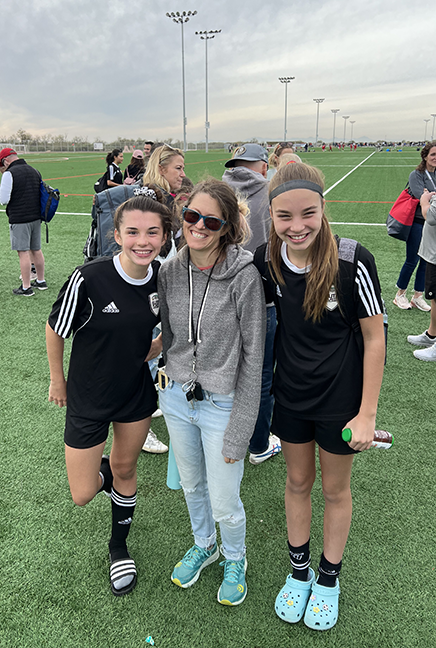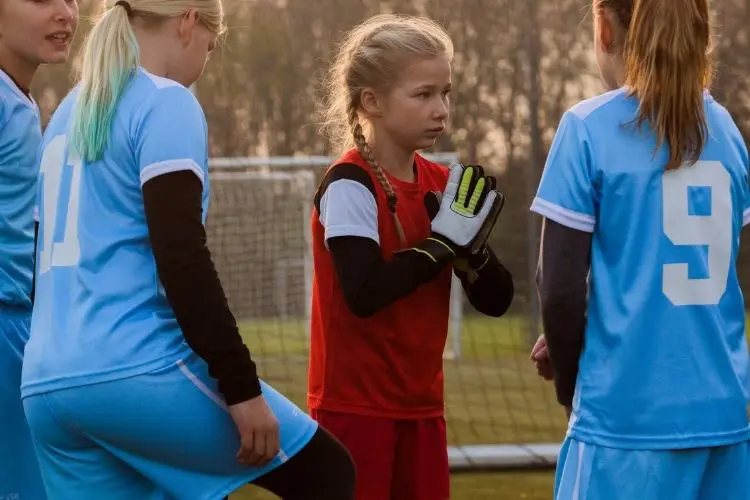Ready to level up your game?!


Our Mission
Expand Your Game’s mission is to inspire female soccer players to focus on their mental wellness, empowering them to cultivate a healthy relationship with the game and maximize their performance on the field.
Through mental skills work, we challenge young women to opt out of systems that were designed to keep them small, and find their own paths to being confident, gritty, joyful young women.

And our WHY
We are living in a time and environment where women and girls receive tons of external messaging keeping them small and weighing them down with limiting beliefs. Girls today are socially conditioned by narrow definitions of success and a ‘right’ way to do things, which can fill them with self-doubt and cause them to feel like they lack something or are not enough. They can start to define their self-worth based solely on things like performance, achievement, physical looks, and other people’s opinions. This leads to constant feelings of inadequacy and failure which, if left uninterrupted, can be a primary determinant in the development of mental health disorders such as anxiety and depression.
On top of this, young female athletes often feel pressure to produce certain results and live up to impossibly-high-unrealistic expectations of perfection (score every game, win all the time, don’t mess up, get all the playing time) and this can take a huge toll not just on their confidence and performance, but their overall wellbeing, sense of self-worth, and love for the game. I know this to be true because I’ve heard it straight from them. This pressure is a very consistent pattern that has shown up in the hundreds and hundreds of 1-on-1 conversations I’ve had with youth female soccer players ages 10-18 over the years.
I was prompted to start Expand Your Game when I saw this pattern playing out right in front of me with a group of 8th grade girls that I was coaching. I had realized that many of the things I was working on in my own self-development as an adult, like overthinking and perfectionism, were holding them back, too. I knew I had to help them get ahead of it not just so they could play better soccer, but so they could live happier lives.
As a coach, after this initial understanding of what was happening, I immediately wanted to help my soccer players apply these lessons of personal growth and expansion within the context of being female athletes, so that they could counteract some of the negative impacts of high-pressure and expectation filled environments in a healthy striving way. I dove headfirst into mental skills and mental wellness work, and most importantly, learning how to make mental performance tools and strategies accessible and USEABLE for middle and high school aged girls (which was the gap I had identified was missing). That was in 2020.
As I got further and further into this work, I started to understand that this endeavor was way bigger than just soccer. This work does improve performance on the field, yes, but more importantly it helps young women feel better about themselves as humans. At Expand Your Game we work hard to help young women develop a foundation of TRUE, deep confidence and belief in themselves and their abilities, find their voices, and build their self-belief – soccer is just the medium.
Right now, more than ever, THIS WORK IS CRUCIAL, and not just for these girls, but for the world as a whole. Although there are days when I feel powerless, and at a loss as to how to stand up for what is right and protect those who are vulnerable on this planet, this work keeps me grounded and focused. I can’t fix everything, but I CAN help as many young women as possible gain self-awareness, become more self-reflective, and learn to coach themselves through adversity. I can help them switch from self-doubt to self-belief and build unshakeable, stable confidence and strong internal validation that they can rely on in the face of social conditioning, negative cultural messaging, and people in their direct environment that try to undermine their humanity.
These young women are capable of amazing feats. But they don’t always feel like they are because ‘the world at large’ has been telling them their whole lives that they need to stay within the system, and do things the ‘right’ way. Follow those ‘shoulds.’ Well – I’m a disruptor. The work I do challenges young women to OPT OUT of the status quo, to be authentic, to know their worth as a human, to BE IN CHARGE of their confidence and not let things outside of their control determine how they feel about themselves.
Expand Your Game is here to help young women not just SURVIVE in this environment of pressure, expectations and comparison culture, but THRIVE 🙌. These young women are going to save the world. I’m sure of it.

Tough Stats and Further Reading...
Let’s start with a reminder: We are not powerless when it comes to making changes to support the collective wellbeing of our teens and young people.
Now, let’s take a closer look at the problem:
- According to the CDC, “teen girls are experiencing record high levels of violence, sadness, and suicide risk.”
- One in seven young people (ages 10-18) suffers from a mental health disorder, with girls almost twice as likely to struggle with “persistent feelings of hopelessness” than boys.
- Staggeringly, according to a 2021 report, 1 in 3 girls had seriously considered suicide. This was a 60% increase from just a decade before.

So, what are the factors? Are they new? And, what can we do about it?
While there are many components of a person’s life circumstance (health, socio-economic status, abuse, housing, community) that may influence their mental health, psychologists have identified a rise in perfectionism and high-stakes achievement culture as two major determinants in poor mental health of young students and athletes (again, particularly amongst girls).
These are social patterns that, while extremely powerful, have an antidote: building up the skills and communities to counteract their negative effects.
Child/Teen Mental Health
BOOK: The Anxious Generation by Jonathan Haidt
BOOK: The Price She Pays: Confronting the Hidden Mental Health Crisis in Women’s Sports – from the Schoolyard to the Stadium by Katie Steele, LMFT and Tiffany Brown Phd, LMFT with Erin Strout
RESEARCH: Athlete Mental Health Statistics by Gender
RESEARCH: Starting young to protect elite athletes’ mental health
RESEARCH: Overall state of teen mental health

Perfectionism and Achievement Culture
ARTICLE: Perfectionism and the high-stakes culture of success: The hidden toll on kids and parents
Excerpt: “Cultivating a drive to succeed is important for providing a sense of purpose, meaning, joy, and well-being, experts said. But when people feel like they can’t ever live up to expectations, the pursuit of perfection can become detrimental to mental health, leading to disconnection from an internal sense of self-worth.”
BOOK: Never Enough: When Achievement Culture Becomes Toxic-and What We Can Do About It by Jennifer Breheny Wallace
FROM THE EYG BLOG: 7 Game-Changing Tips for Dealing with Perfectionism in Soccer
...More Stats and Resources
Let’s start with a reminder: We are not powerless when it comes to making changes to support the collective wellbeing of our teens and young people.
Now, let’s take a closer look at the problem:
- According to the CDC, “teen girls are experiencing record high levels of violence, sadness, and suicide risk.”
- One in seven young people (ages 10-18) suffers from a mental health disorder, with girls almost twice as likely to struggle with “persistent feelings of hopelessness” than boys.
- Staggeringly, according to a 2021 report, 1 in 3 girls had seriously considered suicide. This was a 60% increase from just a decade before.

So, what are the factors? Are they new? And, what can we do about it?
While there are many components of a person’s life circumstance (health, socio-economic status, abuse, housing, community) that may influence their mental health, psychologists have identified a rise in perfectionism and high-stakes achievement culture as two major determinants in poor mental health of young students and athletes (again, particularly amongst girls).
These are social patterns that, while extremely powerful, have an antidote: building up the skills and communities to counteract their negative effects.